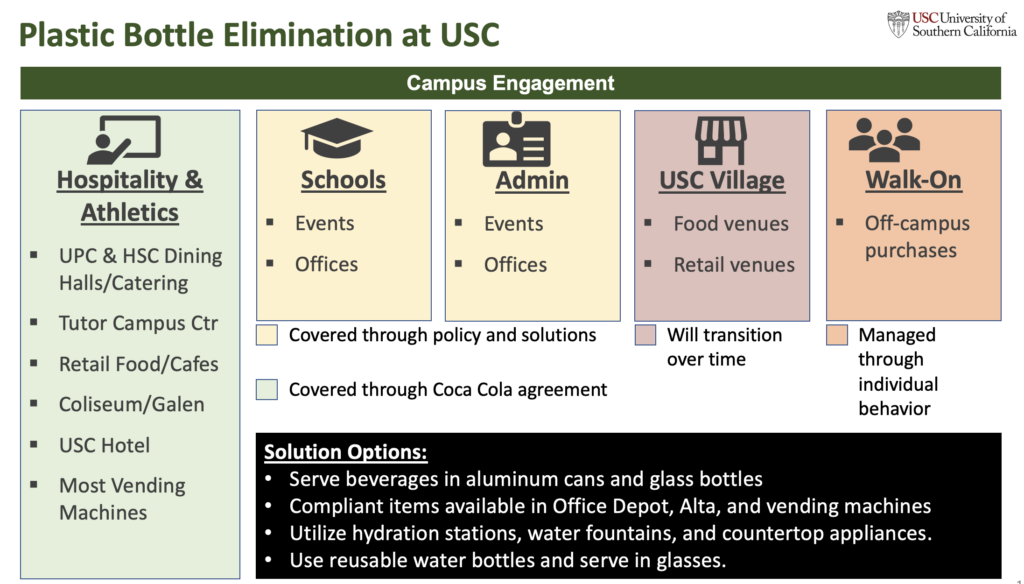
FAQs on USC’s single-use plastic beverage and water bottle elimination policy and best practices.
The reduction of single-use plastic beverage bottles supports the zero waste goal of Assignment: Earth.
If you have a question that is not addressed below, contact plasticfreeusc@usc.edu.
When did the new policy go into effect?
The announcement was made in April 2022 and became effective as of July 1, 2022. In some cases, it may take a few months for units to deplete previously purchased inventory of single-use plastic beverage bottles.
Who is affected by the new policy?
- Everyone! All Trojans have a role to play in eliminating plastics from our campus waste stream.
- All purchases made with USC funds will need to comply with the policy.

- Major entities such as Auxiliary Services and Athletics are working with Reyes Coca-Cola Bottling to transition all Coca-Cola Company beverage products to glass and aluminum bottles/cans in operations, retail locations, and vending machines at UPC and HSC.
- Schools and Administrative units are encouraged to use our Preferred Catalog Suppliers, Office Depot and Alta Foodcraft, for sourcing non-plastic bottle beverages for office use. These suppliers have some product substitutions available now and will continue adding alternatives.
- USC Village food/retail venues that still sell beverages in plastic bottles will transition to alternatives on an individual restaurant basis over time.
Where can I find information on purchasing beverages in non-single-use plastic bottles?
- Book your campus events with USC Hospitality Private Events and Conferences to ensure the use of compliant materials as they are certified by the Green Restaurants Association.
- Contact USC Business Services for sustainable purchasing guidance and additional purchasing resources.
- Compliant aluminum or glass products can be found in the Office Depot and Alta Foodcraft catalogs, both USC Catalog suppliers.
- Set up water dispenser rentals and delivery to help eliminate the need for single-use water containers. Find more information on how to start service or order 5-gallon refills.
Will there be a change in beverage prices?
You are likely to see increases in prices in some products. Auxiliary Services and Athletics will absorb some of the price increases and customers will absorb some. One of the reasons single-use plastics are so abundant is that they are inexpensive to manufacture and the pollution costs are transferred to the planet, other species, and society. Trojans are leading in the efforts to stop this unsustainable practice.
What other steps is USC taking to become a single-use plastics-free campus and to improve our waste diversion efforts?
- USC Hospitality has transitioned their dining operations away from single-use plastics to sustainable alternatives.
- USC has installed 98 new exterior multi-stream waste bins across HSC, UPC, and USC Village, to provide expanded access to recycling and compost receptacles. More bins will be installed in the coming year.
How can I help to reduce single-use plastics on campus?
- Shift to reusable products or easily recyclable items made of aluminum, un-coated paper, glass, and compostable items made from certified compostable materials.
- Use a refillable water bottle, and fill up at one of the 211 hydration stations across campuses. See the Sustainability Map to locate the hydration stations.
- Your purchasing dollar has power – support vendors who reduce or eliminate single-use plastics.
- Avoid bringing single-use plastics to campus.
- Sort and properly dispose of your waste materials on campus.
Why do I still see some plastic beverage bottles in use on campus?
The bulk of single-use plastic beverage bottles will be eliminated as of July 1, 2022. However, some bottles will continue to appear as stocks are depleted, at USC Village vendors, and from individuals bringing bottles onto campus from purchases made off-campus.
What does reusables and single-use plastics mean?
- Reusables – materials that are durable and intended for multiple uses. Items with endless recyclability – materials that can be easily and continuously recycled (e.g. aluminum, glass, etc.).
- Single-use Plastic – plastics that are designed for one time use. The most common single-use plastic beverage bottles are made from #1 PET, and are not safe for reuse. #2 HDPE is another common single-use plastic beverage bottle material, which can be safe for reuse, but is often discarded after one use.